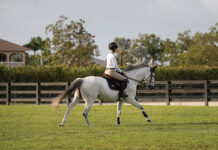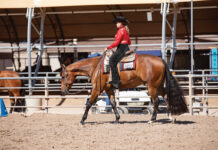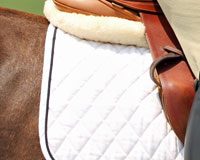Q: I just started working with a Thoroughbred recently home from the track. I’m having a hard time getting him to relax under saddle, go on the bit without pulling, and stay at a slow pace. I called his former owner, who was also his trainer at the track, and he reminded me that race horses lean on the bit and go faster when you pull back on the reins. Do you have any suggestions on how to re-start an ex-racer?
First, you have to give your OTTB plenty of time to readjust his way of thinking. He needs at least a month or more to hang out and see that life away from the track moves at a slower pace. Make sure he has plenty of turn-out time, too. Teach him to longe in both directions and introduce voice commands.
As for your work under saddle, use tack an OTTB is familiar with. Don’t rush into stronger bits and draw reins to force him to go slower and in a show horse frame. While some riders prefer a lightweight western saddle and a smooth loose-ring snaffle combined with a training fork for these early stages, you may be more comfortable in an English saddle, a simple snaffle and a running martingale. Just make sure your equipment is adjusted properly. Then start with your OTTB just like any other green horse.
Work on suppling him and getting him to bend laterally by doing lots of circles. As he tips his nose and bends his neck to turn, soften your contact on your inside rein as a reward. You’ll probably discover that he turns better to the left than to the right, as that’s the direction of tracks in North America. He’ll become more ambidextrous with time.
When you trot, use plenty of half-halts to slow him, and then soften your contact when he complies, even if it’s just for a few strides. Never resort to just hanging on his mouth and pulling; that won’t get you anything other than a fast, tense Thoroughbred. Again, make big, loopy circles to encourage him to soften through his front end and body and to accept the bit as a means of communication, not as a tool to lean on. Don’t try to canter until you have the ability to adjust his pace at the trot. As your schooling progresses, his head will begin to drop and he’ll start reaching for the bit on his own. Truly, if you’re patient and consistent, your horse will acclimate to his new career nicely.
–Cindy Hale
Read more about retraining ex-rachorses >>
Ask your horse and riding questions on the horseillustrated.com Forums >>
See more Expert Q&As >>
Submit your Ask the Expert question >>






I also have an OTTB. He is such a sweetie but he has had his bad moments and there are more to come. When I first got him I rode in an english saddle and then gradually moved onto a western saddle. I still use a D-ring Snaffle bit. First thing to do is let him run around outside in the pasture as much as possible. This will get most of his excess engery out. Then when you want to get him out start by only doing longing. This will make him slow down his mind set of “once I get out I am to run”. This also helps with your voice commands and having him get used to you and build trust. Most TB are taught that if you cluck to them its for walking and trotting, kissing to them is for a faster pace or gallop. When you do start riding him remember that the harder you pull the faster he goes and the further you sit forward the faster he goes. Be loose on the reins and sit deep in the seat. Talk to him alot. Race horses like to be talked to. If he starts to go too fast for you sit down and seesaw the reins and tell him EASY or Easy Walk. I have also used draw reins on my TB this helps him bend and keep his nose down. Do lots of circles and keep him busy. Use leg pressure and lots of pats on the neck and words of encouragement. GOOD LUCK!
Thanks for the great tips.
A very important part of owning an OTTB is to give them a good long time to detox. Racehorses are fed huge amounts of grain as well as “cocktails” to give them a racing edge, and all of that doesn’t just go away within a week or two.
Interesting article. Good advice for non-race horses, too.
This was really helpful as just last week I was riding an OTTB in a lesson and had very little clue the best way to communicate with him (I hadn’t ridden him in a while so we were out of sync). I had no clue that he had been leaning on the bit the whole time but boy oh boy I could tell when I dismounted and relaxed my shoulders.